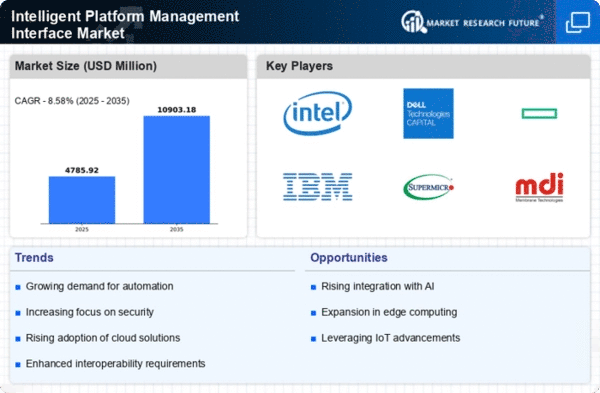Top Industry Leaders in the Intelligent Platform Management Interface Market

The Competitive Landscape of the Intelligent Platform Management Interface Market
The Intelligent Platform Management Interface (IPMI) market isn't just about blinking lights in server rooms anymore. It's become the central nervous system for managing modern data centers, a silent conductor orchestrating the health and performance of complex IT infrastructure. As cloud, AI, and edge computing take center stage, understanding the dynamic landscape of the IPMI market, the strategies driving success, and the key trends shaping its future, is crucial for both established and aspiring players.
Some of the Intelligent Platform Management Interface companies listed below:
- Hewlett Packard Enterprise Development LP (HPE)
- Intel Corporation
- NEC Corporation
- Super Micro Computer, Inc.
- Dell Inc.
- ARM Limited
- Cisco Systems, Inc.
- Huawei Technologies Co. Ltd.
- Microsoft
- IBM Corporation
Strategies Adopted by Leaders:
- Embracing Innovation and Cutting-Edge Technologies: Investing in R&D to integrate advancements like artificial intelligence (AI) for predictive maintenance, machine learning for anomaly detection, and edge computing capabilities for decentralized management, differentiates solutions and caters to evolving user needs.
- Prioritizing User Experience and Ease of Use: Providing intuitive interfaces, user-friendly software platforms, and comprehensive technical support ensures users leverage the full potential of the IPMI solutions and fosters ongoing customer satisfaction.
- Partnerships and Ecosystem Building: Collaborating with server and storage manufacturers, software vendors, system integrators, and cloud service providers expands reach, offers complete solutions, and strengthens brand presence.
- Focus on Scalability and Modular Design: Developing scalable IPMI solutions adaptable to growing IT infrastructures and modular components enables flexible deployments and minimizes upgrade costs.
- Sustainability and Environmental Considerations: Utilizing energy-efficient components, minimizing waste in production processes, and offering compliant packaging cater to customers with growing sustainability concerns.
Factors for Market Share Analysis:
- Product Portfolio and Technological Breadth: The range and sophistication of IPMI solutions offered, encompassing diverse capabilities like remote monitoring, sensor data analysis, security features, and integration with management platforms, significantly impact market reach. Catering to specific IT environments, such as hyperscale data centers or edge deployments, requires tailored solutions and partnerships.
- Target Market Focus: Focusing on specific segments within the technology ecosystem, such as cloud service providers, enterprise data centers, telecommunications companies, or manufacturers of servers and storage systems, requires tailored marketing strategies and partnerships. Addressing the unique needs of each segment can solidify market share within that niche.
- Compliance and Security Features: Ensuring adherence to industry standards and regulations, like Common Platform Management Information (C-PMI) and Platform Baseboard Management Controller (BMC) specifications, strengthens trust and expands market opportunities. Implementing robust security protocols and encryption technologies is paramount for protecting sensitive data in IT infrastructure.
- Software and Data Management: Providing user-friendly management platforms for comprehensive monitoring, data visualization, predictive maintenance capabilities, and integration with existing IT ecosystem tools, enhances user experience and operational efficiency.
- Openness and Interoperability: Supporting open standards and protocols, enabling seamless integration with diverse hardware and software vendors, expands compatibility and fosters wider adoption, particularly in multi-vendor IT environments.
New and Emerging Companies:
- Niche-Focused Startups: Companies like Super Micro and Tyan specialize in developing IPMI solutions for specific server platforms or high-performance computing environments, offering unparalleled expertise and performance optimization for demanding applications.
- Software-Centric Platforms: Companies like Liqid and OpenBMC focus on developing advanced software platforms for IPMI data analysis, security management, and integration with cloud or containerized infrastructure, adding significant value beyond the hardware itself.
- Open-Source Hardware Advocates: Companies like OpenIPMI and the Open BMC Project promote open-source IPMI implementations and readily available hardware designs, empowering researchers and DIY enthusiasts with customization options and fostering innovation within the community.
Latest Company Updates:
Apr. 25, 2023, Elma Electronic announced the development of a VPX Chassis Manager with a redundant management bus for SOSA. The new Chassis Manager for the VITA 46.11 IPMI (Intelligent Platform Management Interface) standard assures the proper operation of the chassis and boards in defence-embedded computing platforms. The redundant Intelligent Platform Management Bus (IPMB) enables managers to monitor the health of the chassis & the boards, report anomalies, and take corrective action when necessary.
Apr. 28, 2022, FS.COM, a high-speed network solution provider, announced a strategic cooperation with Super Micro Computer, Inc. (SMCI), a leading global provider of enterprise computing, storage, networking solutions, and green computing technology.
This expanded collaboration enables these companies to deliver powerful performance and high-reliability rack servers that can provide powerful performance and reliability with 2nd/3rd Gen Intel Xeon Scalable processors. Intelligent Platform Management Interface (IPMI) simplifies the management of the servers and manages the system at chassis and remotely.
Nov. 25, 2022, Supermicro's Intel W790-based motherboards may support Sapphire Rapids or 34-core Raptor Lake CPUs. The Supermicro X13SWA-TF platform has six PCIe 4.0 x16 slots, two 10GbE ports controlled by Intel's X550 chip, and an Intelligent Platform Management Interface (IPMI) for remote management.
Nov. 03, 2022, Curtiss-Wright announced that its PacStar business, a leading developer and supplier of advanced communications solutions for the U.S. Department of Defense (DoD), has launched an enhanced version of its popular PacStar 451 rugged, small form factor network server. With support for Intelligent Platform Management Interface (IPMI), the new PacStar 451 server hardware for defense enables users to set up and manage their tactical server hardware remotely, greatly easing and speeding ease of use and deployment.









